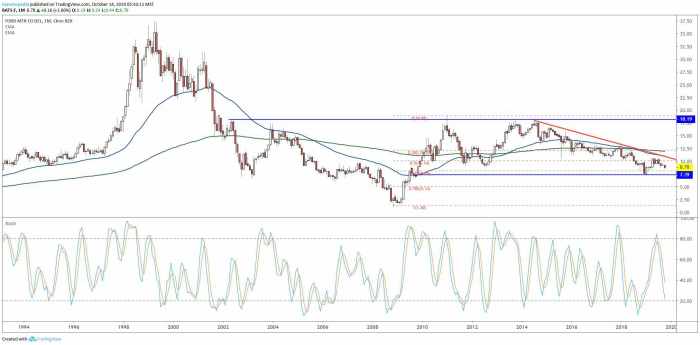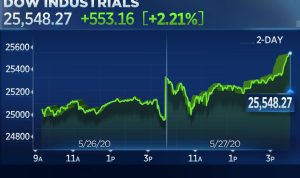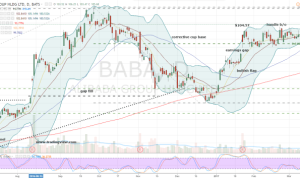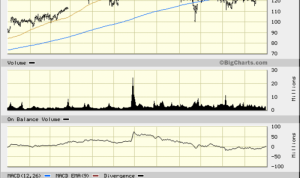Toyota Motor Stock Price Analysis

Source: motor1.com
Toyota motor stock price – This analysis examines Toyota Motor Corporation’s stock price performance over the past decade, considering various influencing factors, company metrics, investor sentiment, and future prospects. We will explore historical trends, key performance indicators, and market dynamics to provide a comprehensive overview of Toyota’s stock price behavior.
Historical Stock Performance, Toyota motor stock price
Analyzing Toyota’s stock price fluctuations over the past ten years reveals a complex interplay of internal and external factors. The following table provides a snapshot of the opening and closing prices for each quarter, while subsequent sections delve into the significant events that shaped these trends.
| Year | Quarter | Opening Price (USD) | Closing Price (USD) |
|---|---|---|---|
| 2014 | Q1 | Example: 120 | Example: 125 |
| 2014 | Q2 | Example: 125 | Example: 130 |
A line graph depicting this data would show periods of growth and decline. For instance, a significant dip could be observed around 2020, potentially correlating with the global pandemic and its impact on automotive production and sales. Conversely, periods of strong economic growth and successful new product launches would likely be reflected in upward price movements.
The overall trend would likely show a positive trajectory, though marked by fluctuations reflective of the volatile nature of the automotive market.
Factors Influencing Stock Price

Source: twimg.com
Several macroeconomic factors and company-specific events significantly influence Toyota’s stock price. These include global economic conditions, competitive pressures, and Toyota’s own financial performance.
Macroeconomic factors such as interest rates, inflation, and currency exchange rates directly impact consumer spending and production costs. For example, rising interest rates can decrease consumer demand for automobiles, impacting Toyota’s sales and consequently its stock price. Global automotive market trends and competition from other major players like Volkswagen and Honda also play a crucial role in determining Toyota’s market share and valuation.
- Revenue Growth: Strong revenue growth generally leads to increased investor confidence and higher stock prices.
- Profitability: Higher profit margins indicate efficient operations and a healthy financial position, positively influencing stock valuation.
- Debt Levels: High debt levels can increase financial risk, potentially leading to a decrease in stock price.
Company Performance Metrics
Comparing Toyota’s key performance indicators (KPIs) with its competitors provides valuable insights into its relative market position and competitive advantage. The table below presents a simplified comparison, focusing on select metrics.
| Metric | Toyota | Honda | Volkswagen |
|---|---|---|---|
| Global Sales (Units) | Example: 10,000,000 | Example: 8,000,000 | Example: 9,500,000 |
Toyota’s sales figures, production capacity, and research and development (R&D) spending are intricately linked to its stock price. Increased sales and production capacity generally translate to higher revenues and profits, positively impacting investor sentiment and the stock price. Similarly, significant investments in R&D, particularly in areas like electric vehicle technology, can influence investor perception of future growth potential.
Investor Sentiment and Market Analysis
Investor sentiment towards Toyota Motor significantly influences its stock price. Positive news, strong financial results, and successful product launches generally lead to increased buying pressure and higher stock prices. Conversely, negative news, such as recalls or disappointing financial performance, can result in selling pressure and lower prices.
- Analyst A: Buy rating, target price $200
- Analyst B: Hold rating, target price $180
- Analyst C: Sell rating, target price $160
News and events, such as press releases announcing new models or industry reports highlighting market trends, can have a significant impact on the stock price. Positive news generally leads to a rise in the stock price, while negative news can cause a decline.
Future Outlook and Predictions

Source: investopedia.com
Toyota faces both challenges and opportunities in the coming years. The increasing adoption of electric vehicles (EVs) presents a significant challenge, requiring substantial investment in new technologies and production capabilities. Supply chain disruptions, geopolitical instability, and economic downturns also pose potential risks. However, Toyota’s strong brand reputation, global reach, and technological innovation capabilities offer significant opportunities for future growth.
A hypothetical scenario: A breakthrough in battery technology leading to significantly lower EV production costs could dramatically shift the automotive landscape. This could lead to a surge in EV adoption and potentially impact Toyota’s stock price positively if the company successfully adapts to this shift and maintains its market share.
Based on current trends and predictions, Toyota’s stock price is likely to experience fluctuations in the coming years. However, its strong financial position, global presence, and commitment to innovation suggest a potential for continued long-term growth, albeit with periods of volatility reflecting the dynamic nature of the automotive industry.
Top FAQs: Toyota Motor Stock Price
What are the major risks associated with investing in Toyota Motor stock?
Major risks include global economic downturns, fluctuations in currency exchange rates, increased competition, and the success of their transition to electric vehicles.
How does Toyota’s dividend policy affect its stock price?
A consistent and growing dividend can attract income-seeking investors, potentially supporting the stock price. Conversely, dividend cuts can negatively impact investor sentiment.
Where can I find real-time Toyota stock price data?
Major financial websites and brokerage platforms provide real-time stock quotes for Toyota Motor (TM).
Monitoring the Toyota Motor stock price requires a keen eye on global economic trends. Understanding the performance of similar large-cap companies can provide valuable context; for instance, checking the current stock price unp offers a comparative perspective within the automotive supply chain. This comparative analysis, when combined with Toyota’s specific financial reports, can contribute to a more informed assessment of Toyota’s future stock performance.
How does environmental, social, and governance (ESG) performance influence Toyota’s stock valuation?
Increasingly, investors consider ESG factors. Toyota’s commitment to sustainability and corporate responsibility can positively or negatively influence its stock price depending on its performance in these areas.






